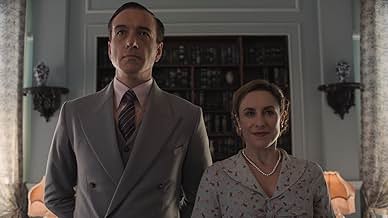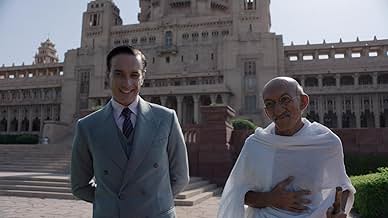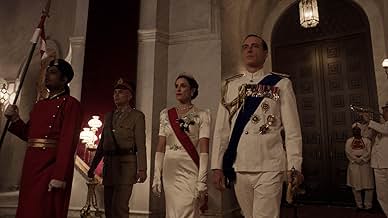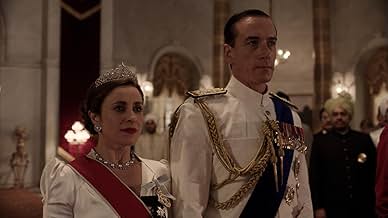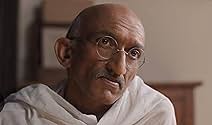Freedom at Midnight
- Série télévisée
- 2024–
ÉVALUATION IMDb
8,3/10
2,2 k
MA NOTE
Ajouter une intrigue dans votre langueIs the electrifying story of India's struggle for independence. Based on the bestselling book of the same name, it recounts the partition of India and Pakistan, and the religious and socio-p... Tout lireIs the electrifying story of India's struggle for independence. Based on the bestselling book of the same name, it recounts the partition of India and Pakistan, and the religious and socio-political dynamics of the era.Is the electrifying story of India's struggle for independence. Based on the bestselling book of the same name, it recounts the partition of India and Pakistan, and the religious and socio-political dynamics of the era.
- Prix
- 10 nominations au total
Parcourir les épisodes
Avis en vedette
"Heat not a furnace for your foe so hot that it do singe yourself."
Freedom at Midnight is a series based on Larry Collins and Dominique Lapierre's gigantic bestseller of the same name. Given the piercingly researched, strikingly visual source-material, it was always meant to be. Collins and Lapierre finished the book in 1975, just 25 years after India gained independence.
Starting in the early 1970s, the authors had unprecedented personal access to Lord Mountbatten, who was a fan of their book "Is Paris Burning?". They also accessed Jinnah's X-ray, which proved that so-called Quaid-e-Azam knew he suffered from advanced stage tuberculosis and that he wouldn't survive long - maximum a year or so!! Mountbatten told Lapierre-Collins that if he knew this, he would have delayed the decision on partition, which would have then changed the course of sub-continent's history.
Nikhil Advani, the creator of the series, says he chose to focus on events leading up to India's independence. However, Freedom at Midnight is a difficult show to make, as it is about history and politics and relies heavily on verbose conversations, meetings, debates, speeches, decisions, exposition, heavy dialogues and individual's perception.
The series features impressive performances, particularly from Chirag Vohra as Gandhi and Rajendra Chawla as Sardar Vallabhbhai Patel. Vohra delivers a physically canny rendition of Gandhi, while Chawla nails the Gujarati twang and injects Patel's shrewdness with pangs of paternal sincerity.
It's worth noting that the book "Freedom at Midnight" has been adapted into various forms, including a TV series in 1988 and a movie Gandhi with Ben Kingsley directed by Richard Attenborough. While the movie focuses primarily on Gandhi's life and role in India's struggle for independence, this TV series takes a broader approach, covering the final years of British rule in India and the events leading up to independence. This series is more of a historic epic with more emphasis on political and social upheavals of the time. It manages to capture the essence of the time period.
I have a personal connection with this book having read it during my college days. It was one of the first books (first book being The Good Earth) in English literature that I read and it left an everlasting impression on me. Even today, it gives me goosebumps to think about the horrifying incidents written by the authors, particularly the riots that started in Punjab.
After reading "Freedom at Midnight", I became a huge fan of the author duo and went on to read their other books in a marathon session. I devoured "Is Paris Burning?", "O Jerusalem", "City of Joy" and "Fall from Grace", among others. I owe a debt of gratitude to my dear friend Chetan Desai who introduced me not only to Collins and Lapierre but also to other renowned authors like Leon Uris, Somerset Maugham, Ayn Rand, Hermann Hesse and more. He also sparked my interest in English literature that has been a lifelong passion since then.
While the series may be challenging to follow at times due to its focus on politics and history, it is undoubtedly a must-watch for anyone interested in last days of British Raj and dawn of India's freedom. The ability of this series to balance individual perspectives with historical events makes it a unique and engaging viewing experience.
Overall, Freedom at Midnight is a gripping and informative series that sheds light on a pivotal moment in Indian history. I do however recommend reading the book.
Freedom at Midnight is a series based on Larry Collins and Dominique Lapierre's gigantic bestseller of the same name. Given the piercingly researched, strikingly visual source-material, it was always meant to be. Collins and Lapierre finished the book in 1975, just 25 years after India gained independence.
Starting in the early 1970s, the authors had unprecedented personal access to Lord Mountbatten, who was a fan of their book "Is Paris Burning?". They also accessed Jinnah's X-ray, which proved that so-called Quaid-e-Azam knew he suffered from advanced stage tuberculosis and that he wouldn't survive long - maximum a year or so!! Mountbatten told Lapierre-Collins that if he knew this, he would have delayed the decision on partition, which would have then changed the course of sub-continent's history.
Nikhil Advani, the creator of the series, says he chose to focus on events leading up to India's independence. However, Freedom at Midnight is a difficult show to make, as it is about history and politics and relies heavily on verbose conversations, meetings, debates, speeches, decisions, exposition, heavy dialogues and individual's perception.
The series features impressive performances, particularly from Chirag Vohra as Gandhi and Rajendra Chawla as Sardar Vallabhbhai Patel. Vohra delivers a physically canny rendition of Gandhi, while Chawla nails the Gujarati twang and injects Patel's shrewdness with pangs of paternal sincerity.
It's worth noting that the book "Freedom at Midnight" has been adapted into various forms, including a TV series in 1988 and a movie Gandhi with Ben Kingsley directed by Richard Attenborough. While the movie focuses primarily on Gandhi's life and role in India's struggle for independence, this TV series takes a broader approach, covering the final years of British rule in India and the events leading up to independence. This series is more of a historic epic with more emphasis on political and social upheavals of the time. It manages to capture the essence of the time period.
I have a personal connection with this book having read it during my college days. It was one of the first books (first book being The Good Earth) in English literature that I read and it left an everlasting impression on me. Even today, it gives me goosebumps to think about the horrifying incidents written by the authors, particularly the riots that started in Punjab.
After reading "Freedom at Midnight", I became a huge fan of the author duo and went on to read their other books in a marathon session. I devoured "Is Paris Burning?", "O Jerusalem", "City of Joy" and "Fall from Grace", among others. I owe a debt of gratitude to my dear friend Chetan Desai who introduced me not only to Collins and Lapierre but also to other renowned authors like Leon Uris, Somerset Maugham, Ayn Rand, Hermann Hesse and more. He also sparked my interest in English literature that has been a lifelong passion since then.
While the series may be challenging to follow at times due to its focus on politics and history, it is undoubtedly a must-watch for anyone interested in last days of British Raj and dawn of India's freedom. The ability of this series to balance individual perspectives with historical events makes it a unique and engaging viewing experience.
Overall, Freedom at Midnight is a gripping and informative series that sheds light on a pivotal moment in Indian history. I do however recommend reading the book.
This Era Youth Needs to Understand the Real History and I will give freedom at midnight 10/10 as this is eye-opener for the youth. INDIA National Congress Have always thought of both Hindu Muslim in india
The kind of radical thinking going in country needed this eye-opener
The Bond of Jawahar Lal Nehru Andd Sadar Vallabh Bhai Patel Is So Beautiful Brotherly friend
The Way Sadar Vallabh Bhai Patel Respected Gandhi Ji
Jinnah's Thought and The Direct Action Day Plan the brutality happened in india and how Only congress party stood for them shows the unity thought of INDIAN NATION CONGRESS......
The Way Sadar Vallabh Bhai Patel Respected Gandhi Ji
Jinnah's Thought and The Direct Action Day Plan the brutality happened in india and how Only congress party stood for them shows the unity thought of INDIAN NATION CONGRESS......
I was waiting for this series release since I saw the trailer. The trailer was enough to create an excitement for the series. The series intro is a masterpiece in its self, the music creates an different environment, it feels patriotic. Over all performance of the actors was remarkable, among them I loved the performance of 'Arif Zakaria' as Mohammad Ail jinnah. He played the role very wisely and precisely which I loved the most. About the story, I loved the story telling is so good. There is so much in the series which tells about the separation history of India. There is so much English used in the series which makes it little difficult to understand for normal audience, but there are subtitles available to understand. The series also does what it says in its tagline, "The history you may not know, The history you should know". And at the last but not the list, the director 'Nikhil Advani' did a great direction overall the series. I would like to thank the team of 'Freedom at Midnight' to give such a treat to us by showing us the history that we all should know as being an Indian.
An absolute masterpiece, portraying the true architects of our freedom struggle. As the film-makers have told us in the tagline, this is the history that we should know. I would go one step further and say that this is the history that we, as a nation, NEED to know, especially in today's times when the true Fathers of our nation are being ridiculed, vilified, blamed, and stripped of all the credit they deserve.
The series portrays the struggles behind Partition, how the Congress, as a whole, tried their utmost to stop it, how the Mahatma did not compromise with his ideals till the very end, how the League tried (and ultimately succeeded) to extort a Nation merely based on the inferiority complex of their leader, and how selfish the British truly were.
My salute to the Director, Mr. Nikhil Advani, and to Sony LIVV for bringing this important piece of history to our screens. My salute to the casting director for being so spot on with his/her casting choices!
Overall, one of the best and most important web series that I have watched. The ending, as well, makes me think that there could be another season of this showing the horrors of the actual partition and the aftermath, especially the contribution of Sardar Patel in the accession of princely states and the vision of Dr. Nehru during his tenure as Prime Minister.
The series portrays the struggles behind Partition, how the Congress, as a whole, tried their utmost to stop it, how the Mahatma did not compromise with his ideals till the very end, how the League tried (and ultimately succeeded) to extort a Nation merely based on the inferiority complex of their leader, and how selfish the British truly were.
My salute to the Director, Mr. Nikhil Advani, and to Sony LIVV for bringing this important piece of history to our screens. My salute to the casting director for being so spot on with his/her casting choices!
Overall, one of the best and most important web series that I have watched. The ending, as well, makes me think that there could be another season of this showing the horrors of the actual partition and the aftermath, especially the contribution of Sardar Patel in the accession of princely states and the vision of Dr. Nehru during his tenure as Prime Minister.
At the stroke of midnight on August 14, 1947, India gained freedom from over 200 years of British colonial rule. While the birth of a free India should have been a moment of celebration, it was overshadowed by the darkness of Partition. Nikkhil Advani's Freedom At Midnight, a latest web series on SonyLIV, which takes its title and story from Larry Collins and Dominique Lapierre's seminal book, offers a powerful glimpse into the trials, tragedies, and turmoil of that fateful period.
The series begins in 1946 with a persistent Mahatma Gandhi declaring, "Hindustan ka batwara hone se pehle, mere shareer ka batwara hoga (Before the Partition of India, my body will be divided)." It soon moves over to offer a painful account of India's Partition and the violent birth of Independent India. Religious conflicts, border wars, and political sacrifices unfold with each episode, like dramatic scenes in a grand pageant.
The dialogues and performances strike emotional chords quite effectively. Take, for example, lines like "Aam aadmi vo badlaav laa sakta hai jo sarkaar saalon mein nahi laa sakti" (The common man can bring about change that the government couldn't in years) or "Ye log Hindu hone se pehle bhi Punjabi ya Bengali hain" (These people are Punjabi or Bengali before they are Hindu).
The central characters in the show include Lord Mountbatten, the great-grandson of Queen Victoria, who constantly haggles with Jawaharlal Nehru, the leader of the Congress party, torn between his principles and his party's ideals; Mohammed Ali Jinnah, the fanatical leader of the Muslim League, who sees only two options: "Ya toh Hindustan batega ya barbaad hoga" (Either Hindustan will be divided, or it will be destroyed); and MK Gandhi, who ultimately gives up his dream of a united India, over the terms of how an independent India will move forward.
Siddhant Gupta, who was well admired in Prime Video's Jubilee, once again proves his acting prowess as he steps into the role of India's first Prime Minister, Jawaharlal Nehru. But the standout performance comes from Arif Zakaria as Mohammed Ali Jinnah. He is utterly convincing as the resolute leader of the Muslim League, whose singular vision was the creation of Pakistan. Chirag Vohra as Gandhi and Rajendra Chawla as Sardar Vallabhbhai Patel also deliver strong performances. The supporting cast further elevates the series, adding an extra layer of depth to the story.
Nikkhil Advani closes the show just before the horrors of the Partition unfold on India's land, accompanied by the song "Vaishnav jan to tene kahiye je, peer paraayi jaani re" (A good human being is the one who knows the pain of others). It's a haunting note that leaves you wishing political leaders, from any period - past or present - could truly feel the pain of the people they serve.
Not only is it competently crafted and acted, it also tells a story replete with known and unknown nuggets of information that are processed with skill and sensitivity. It has no grandstanding, and no hectoring and hollering of the sort that mainstream Bollywood is prone to.
The show gives history its due, meticulously piecing together the fragments that went into the making of an essential and wondrous, if inevitably imperfect, whole.
The series begins in 1946 with a persistent Mahatma Gandhi declaring, "Hindustan ka batwara hone se pehle, mere shareer ka batwara hoga (Before the Partition of India, my body will be divided)." It soon moves over to offer a painful account of India's Partition and the violent birth of Independent India. Religious conflicts, border wars, and political sacrifices unfold with each episode, like dramatic scenes in a grand pageant.
The dialogues and performances strike emotional chords quite effectively. Take, for example, lines like "Aam aadmi vo badlaav laa sakta hai jo sarkaar saalon mein nahi laa sakti" (The common man can bring about change that the government couldn't in years) or "Ye log Hindu hone se pehle bhi Punjabi ya Bengali hain" (These people are Punjabi or Bengali before they are Hindu).
The central characters in the show include Lord Mountbatten, the great-grandson of Queen Victoria, who constantly haggles with Jawaharlal Nehru, the leader of the Congress party, torn between his principles and his party's ideals; Mohammed Ali Jinnah, the fanatical leader of the Muslim League, who sees only two options: "Ya toh Hindustan batega ya barbaad hoga" (Either Hindustan will be divided, or it will be destroyed); and MK Gandhi, who ultimately gives up his dream of a united India, over the terms of how an independent India will move forward.
Siddhant Gupta, who was well admired in Prime Video's Jubilee, once again proves his acting prowess as he steps into the role of India's first Prime Minister, Jawaharlal Nehru. But the standout performance comes from Arif Zakaria as Mohammed Ali Jinnah. He is utterly convincing as the resolute leader of the Muslim League, whose singular vision was the creation of Pakistan. Chirag Vohra as Gandhi and Rajendra Chawla as Sardar Vallabhbhai Patel also deliver strong performances. The supporting cast further elevates the series, adding an extra layer of depth to the story.
Nikkhil Advani closes the show just before the horrors of the Partition unfold on India's land, accompanied by the song "Vaishnav jan to tene kahiye je, peer paraayi jaani re" (A good human being is the one who knows the pain of others). It's a haunting note that leaves you wishing political leaders, from any period - past or present - could truly feel the pain of the people they serve.
Not only is it competently crafted and acted, it also tells a story replete with known and unknown nuggets of information that are processed with skill and sensitivity. It has no grandstanding, and no hectoring and hollering of the sort that mainstream Bollywood is prone to.
The show gives history its due, meticulously piecing together the fragments that went into the making of an essential and wondrous, if inevitably imperfect, whole.
Le saviez-vous
- AnecdotesAdapted from the book of the same name, authored by Dominique Lapierre and Larry Collins.
Meilleurs choix
Connectez-vous pour évaluer et surveiller les recommandations personnalisées
Détails
- Couleur
Contribuer à cette page
Suggérer une modification ou ajouter du contenu manquant

Lacune principale
What is the Brazilian Portuguese language plot outline for Freedom at Midnight (2024)?
Répondre
![Regarder Trailer [OV]](https://m.media-amazon.com/images/M/MV5BOWRlODBkMWItNzdlMC00MDhjLThmNjAtNGYyMzg0NDNlZmI3XkEyXkFqcGdeQXRyYW5zY29kZS13b3JrZmxvdw@@._V1_QL75_UX500_CR0)
